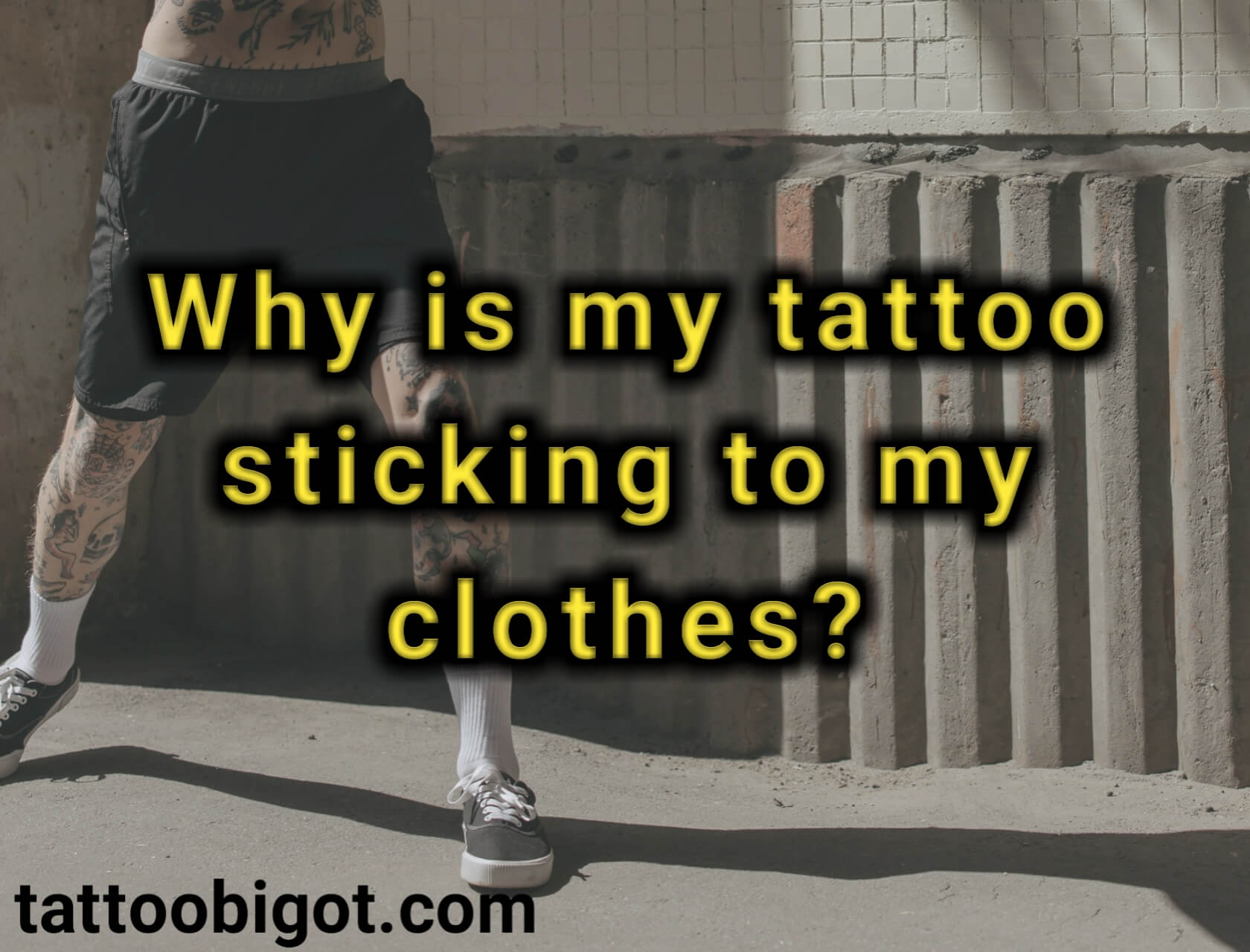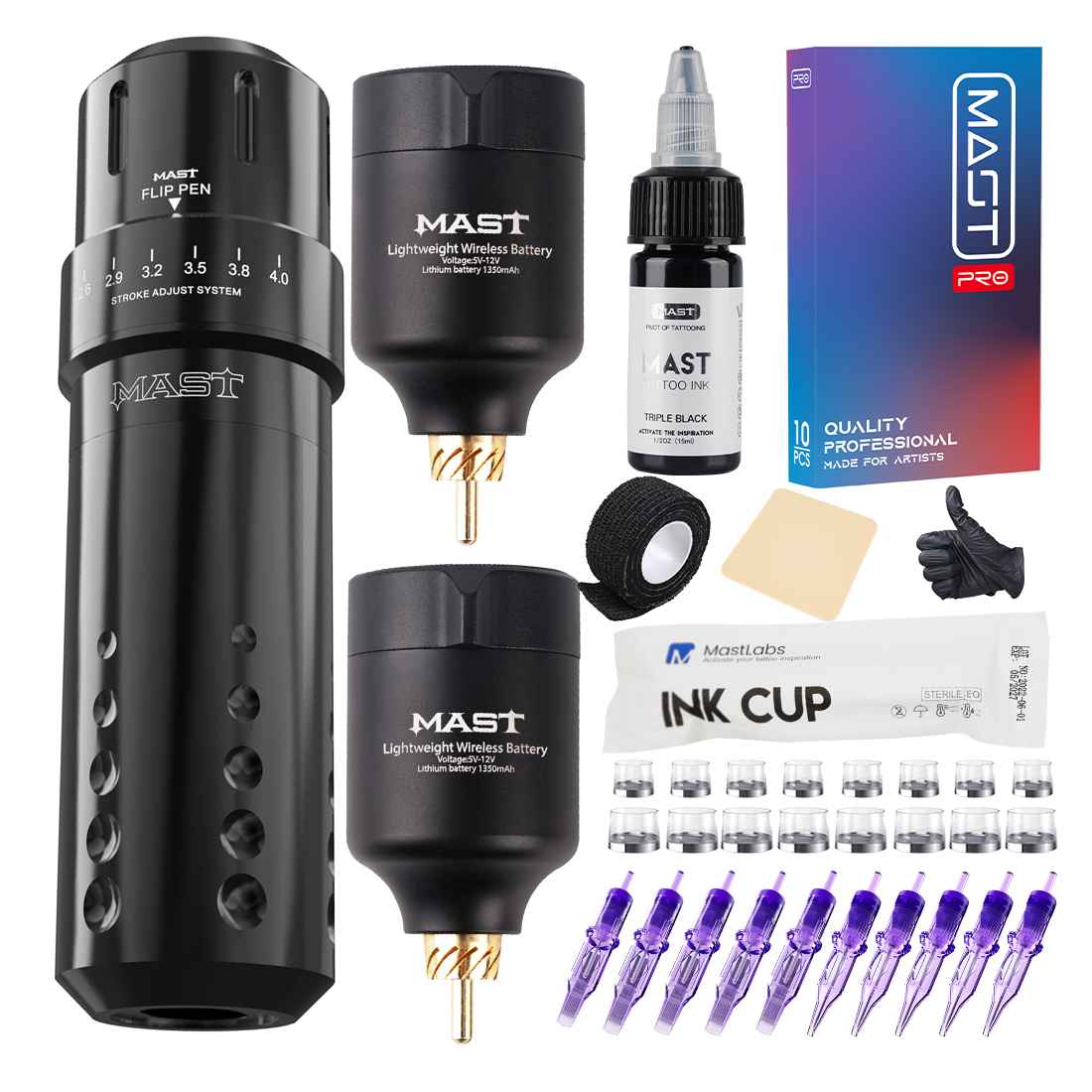Getting a tattoo is an exciting and personal experience for many individuals.
Once the tattooing process is complete, proper aftercare becomes crucial for the healing and preservation of the tattoo’s quality.
During the healing period, it’s essential to be mindful of potential issues that may arise, including the tattoo sticking to clothes.
Understanding the underlying causes can help you take appropriate steps to ensure optimal healing and protect your tattoo from damage.
In this article, we will explore the question, “Why is my tattoo sticking to my clothes?”.
We will look at the reasons behind tattoo stickiness and provide insights into the impact of clothes rubbing on tattoos. Let’s delve into the details.
Why is my tattoo sticking to my clothes?
Tattooing involves the penetration of the skin with ink, resulting in a wound. The healing process consists of several stages, including scabbing, peeling, and regeneration of the skin.
During these stages, the tattoo may exude plasma, blood, and excess ink, creating a sticky surface that can adhere to fabrics.
Apart from that, we all know that, applying ointment or moisturizer to the tattoo is an essential part of aftercare.
However, excessive application can lead to an accumulation of residue on the skin’s surface, making it more prone to sticking to clothes.
Likewise certain fabrics, such as cotton or synthetic materials, have fibers that can cling to the tattoo’s surface.
Additionally, some fabrics have adhesive properties that can cause the tattoo to stick more easily.
Also Read: Can Clothes Stick on a New Tattoo?: How to Prevent It
What happens if clothes rub on tattoo?
When clothes rub against a healing tattoo, it can create friction and irritation on the sensitive skin. This friction can disrupt the healing process and lead to discomfort or pain.
Continuous rubbing or pulling of clothes against a fresh tattoo can disturb the formation of scabs and prolong the healing time. It may also result in scarring or an uneven healing pattern, affecting the overall appearance of the tattoo.
In addition, rubbing clothes against a healing tattoo can introduce dirt, bacteria, or other harmful substances, increasing the risk of infection. Infections can cause complications and hinder the healing process.
Is it normal for tattoo ink to get on clothes?
During the initial stages of healing, a fresh tattoo may bleed or exude excess ink, which can transfer onto clothes. This is a natural part of the healing process and should diminish as the tattoo heals.
Following proper aftercare guidelines, including regular cleaning and moisturizing, can minimize the risk of ink transfer onto clothes. Proper care helps in maintaining the tattoo’s integrity and reducing the chances of ink smudging on fabrics.
Also Read: What to Do If Your Tattoo Sticks to Your Clothes?
What does it mean when your tattoo is sticky?
Overapplying ointment or lotion to the tattooed area can create a sticky film. While moisture is necessary for healing, excessive application can prolong the stickiness and make the tattoo prone to adhering to clothes.
In some cases, a sticky tattoo might indicate a delayed healing process. Factors such as inadequate aftercare, poor hygiene, or an underlying health condition can contribute to delayed healing and increased stickiness.
What can ruin a new tattoo?
Neglecting proper aftercare practices, such as failure to keep the tattoo clean, moisturized, and protected from excessive sun exposure, can have detrimental effects on the healing process. It may result in infection, fading, distortion, or even complete ruin of the tattoo.
Exposing a fresh tattoo to direct sunlight, chlorinated water, or harsh chemicals can lead to fading, discoloration, or infection. It is crucial to shield the tattoo from these elements until it has fully healed.
Also Read: Wearing Pants with a New Leg Tattoo: Finding Comfort and Care
How do I know if my new tattoo is ruined?
Signs of a ruined tattoo due to infection include increased pain, redness, swelling, pus discharge, and a foul odor. If you suspect an infection, it’s important to seek medical attention promptly.
A ruined tattoo may also exhibit distortion or fading of the original design. This can occur due to inadequate healing, excessive scabbing, or improper aftercare.
Apart from these, if the tattoo doesn’t follow the typical healing process, such as prolonged redness, excessive scarring, or raised bumps, it may indicate that the tattoo has been compromised.
When can I start wearing clothes over my tattoo?
Your tattoo artist will provide specific aftercare instructions tailored to your tattoo. It’s essential to follow their guidance regarding when it is safe to start wearing clothes over the tattooed area.
In general, it is recommended to wait until the tattoo has completed the healing process before allowing clothes to rub against it.
This duration can vary depending on the size, location, and individual healing capabilities. Consulting with your tattoo artist can provide clarity on the appropriate timeline for clothing contact.
Also Read: How to Keep Your Tattoo from Sticking to Clothes?
Can I use baby oil on my tattoo?
While baby oil may provide temporary relief from stickiness, it is not recommended as a primary aftercare product for tattoos.
Instead, opt for tattoo-specific aftercare products recommended by your tattoo artist or dermatologist. These products are formulated to promote healing and protect the tattoo without compromising its quality.
If you have concerns about stickiness or aftercare, it’s best to consult your tattoo artist. They have the expertise to guide you on suitable aftercare products and practices to maintain the health and longevity of your tattoo.
Also Read: Wearing Clothes Over a New Tattoo: A Complete Guide to Aftercare
Conclusion
In conclusion, having covered the question “Why is my tattoo sticking to my clothes?”, it is not unusual for tattoos to stick to clothes during the healing process.
Understanding the reasons behind this issue, such as the tattoo healing process, excess ointment, and fabric properties, can help you take appropriate measures to prevent damage and promote optimal healing.
Following proper aftercare guidelines, avoiding friction and irritation, and consulting with your tattoo artist are essential steps to ensure the longevity and vibrancy of your tattoo.
FAQs
How long does a tattoo typically take to heal?
The healing time for a tattoo can vary depending on several factors, including the size, location, and individual’s healing process.
In general, it takes about 2 to 4 weeks for the outer layers of the skin to heal, but complete healing can take up to several months.
Can I wear tight clothing over my healing tattoo?
It is generally recommended to avoid tight clothing over a healing tattoo. Tight clothing can cause friction and irritation, which may disrupt the healing process and increase the risk of complications. Opt for loose-fitting and breathable clothing during the healing period.
Is it normal for a new tattoo to feel sticky?
Yes, it is normal for a new tattoo to feel sticky during the initial healing stages. The sticky sensation can be caused by the ointments and moisturizers applied to aid in the healing process. Following proper aftercare instructions and keeping the tattoo clean and dry will help alleviate the stickiness.
What should I do if my tattoo sticks to clothes?
If your tattoo sticks to clothes, it’s important to avoid forcefully pulling them apart, as this can damage the tattoo or disrupt the healing process.
Instead, gently moisten the area with lukewarm water to help loosen the fabric and minimize discomfort. Seek advice from your tattoo artist if you have concerns.
Can I use regular lotion on my healing tattoo?
It is generally recommended to avoid using regular lotions on a healing tattoo, as they may contain ingredients that can irritate the tattoo or interfere with the healing process.
It is best to use a tattoo-specific aftercare product recommended by your tattoo artist to ensure proper healing and maintenance.






